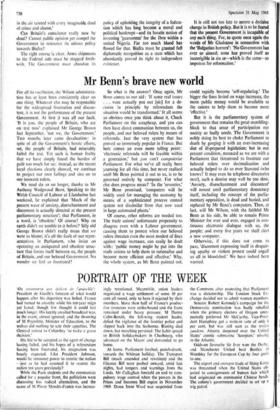Mr Benn's brave new world
For all its vacillation, the Wilson administra- tion has at least been consistently clear on one thing. Whatever else may be responsible for the widespread frustration and discon- tent, it is not the performance of the present Government. At first it was all our fault. 'It is you, the people of Britain, who are on test now' explained Mr George Brown last September, 'not we, the Government.' Two months later came devaluation: in spite of all the Government's heroic efforts, we, the people of Britain, had miserably failed the test. Yet such is human frailty that we have simply found the burden of guilt too much for us: instead, as the recent local elections clearly showed, we continue to project our own failings and sins on to our innocent rulers.
We need do so no longer, thanks to Mr Anthony Wedgwood Benn. Speaking to the Welsh Council of Labour at Llandudno last weekend, he explained that 'Much of the present wave of anxiety, disenchantment and discontent is actually directed at the present parliamentary structure'; that Parliament, in a word, is 'obsolete.' Of course! Why on earth didn't we tumble to it before? Silly old George Brown didn't really mean that we were to blame; it's all the fault of our repre- sentatives in Parliament, who insist on operating an antiquated and obsolete struc- ture that forces itself between us, the people of Britain. and our beloved Government. No wonder we feel so frustrated! So what is the answer? Once again, Mr Benn comes to our aid: 'If some real issues . . . were actually put out [sic] for a de- cision in principle by referendum the situation would be transformed.' It all seems so obvious once you think about it. Chuck Parliament on the scrapheap, and you can then have direct communion between us, the people, and our beloved rulers by means of referenda. Just the very system that has proved so immensely popular in France. But here comes an even more telling point: `electronic referenda will be feasible within a generation,' but you can't computerise Parliament. For what we've all really been yearning for all this time, but never realised until Mr Berm pointed it out to us, is to be governed entirely by computer. For what else does progress mean? 'In the 'seventies,' Mr Bens promised, 'computers will be widely used for managing the economy by means of a sophisticated process control system not dissimilar from that now used in large automated plants.'
Of course, other reforms are needed too. The trade unions' unfortunate propensity to disagree even with a Labour government, causing them to protest when our beloved rulers threaten even the most modest of fines against wage increases, can easily be dealt with: 'public money might be put into the trade unions to help them to rationalise and become more efficient and effective.' Why, the whole system, as Mr Benn pointed out, could rapidly become 'self-regulating.' The bigger the fines levied on wage increases, the more public money would be available to the unions to help them to become more 'effective.'
But it is the parliamentary system of government that remains the great stumbling- block to that sense of participation our society so badly needs. The Government is nobly doing its best to choke Parliament to death by gorging it with an ever-increasing diet of ill-prepared legislation; but in our present condition, menaced as we are with a Parliament that threatened to frustrate our beloved rulers over decimalisation and actually helped to do so over Stansted (who knows? It may even be telephone directories next), such a - demise may well be too slow. `Anxiety, disenchantment and discontent' will mount until parliamentary democracy itself, including the concept of the parlia- mentary opposition, is dead and buried, and replaced by Mr Benn's computers. Then, at last, will Mr Wilson, with the faithful Mr Benn at his side, be able to remain Prime Minister for ever and ever, engaged in con- tinuous electronic dialogue with us, the people; and every five years we shall elect a new computer.
Otherwise, if this does not come to pass. 'discontent expressing itself in despair- ing apathy or violent protest could engulf us all in bloodshed.' We have indeed been warned.






































 Previous page
Previous page